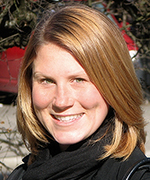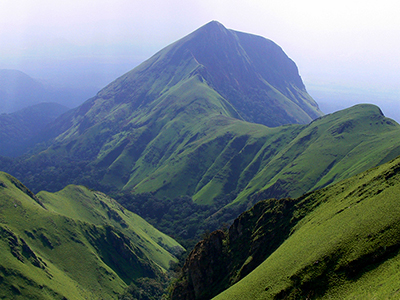Maura Reilly (Class of 2009)

- senior double major in Anthropology and Zoology
- co-major in Environmental Science
- from Dover, OH
- past President of Miami's Primatology Club
- received Undergraduate Summer Scholars award for 2009
- hopes to have a career as a university teacher and researcher
Our original conversation with Maura was conducted in October 2008.
Update: March 2011

Nimba Mountains, Guinea, West Africa
"I graduated from Miami University in May 2010 and promptly left for my 2nd field season in Yasuní National Park Ecuador. Our 4-man research team spent 9 weeks collecting data on the diet and ranging patterns of squirrel monkeys (Saimiri sciureus). The data is currently being analyzed. We have high hopes that the research will result in a conference presentation and scientific publication.
"In 2 weeks time, I leave for my next big adventure: I am about to embark on a 13-month research trip to the Nimba Mountains of Guinea, West Africa. I will be a research assistant to Dr. Kathelijne Koops (University of Cambridge, U.K.) at the Bossou-Nimba field sites, which are owned and operated by Kyoto University in Japan. We will examine elementary technology of foraging and shelter in chimpanzees (Pan troglodytes verus). This opportunity arose through the study abroad program to the University of Cambridge, which I completed as a Miami student 2 years ago."
Original Conversation: October 2008
How did you choose MU?
"When I was a senior in high school, I was required to write a research paper on any topic that I found interesting. I chose to research the famous Dian Fossey and her mountain gorillas. I became fascinated by primates and animal behavior. I knew right away that it was what I wanted to do with my life and I knew that I needed to go to a university with a strong zoology program. Once I was here I discovered that anthropology was also a good fit. I wanted a school where students cared primarily about academics. I also wanted to be in an open learning environment. I found both of those at Miami."
Did anything surprise you during your first year at Miami?
"In one of my first science classes, the professor said that every undergraduate should do research as early as possible. After class, I asked him about the possibility of doing research in the lab. I worked with a grad student researching cannibalism in crickets. I found that I like the research process. I enjoyed asking questions and then doing experiments to find the answers."
"The professors really work to bring out your abilities … I can say that my professors have helped me become an independent thinker."
What do you like most about Miami?
"For me, it's the mutual respect between professors and students. Most of my professors have a lot of respect for us. They have high expectations for students, but they are achievable. The professors really work to bring out your abilities. I was encouraged to ask questions and was given the freedom to design some of my own projects. Their belief in my abilities gives me personal and academic fulfillment. I can say that my professors have helped me become an independent thinker."
"[Our research] project led to a podium presentation in front of professionals at the American Association of Physical Anthropologists ... It was one of the best experiences I've had."
Have you had any research opportunities at Miami?
"I've worked on primate research projects with Anthropology professors. I helped analyze data that the professors collected in the field. We'd meet weekly to discuss the results and to bounce ideas off one another. This project led to a podium presentation in front of professionals at the American Association of Physical Anthropologists. I was nervous beforehand, but I practiced my presentation in front of the Primatology Club and found that I could coherently explain our project. It was one of the best experiences I've had.
"I also received an Undergraduate Summer Scholars award to conduct research in Ecuador this coming summer (2009). The title of my project is 'Examining Diet and Ranging of Squirrel Monkeys (Saimiri sciureus) at Yasuní National Park, Ecuador'."
How about leadership opportunities?
"As a freshman, I was really shy. I decided that I should get involved in clubs so I could meet other students and make friends. I joined the Primatology Club and am now a past president. At our meetings we do stuff like play Primate Jeopardy, listen to student research presentations, and host visiting presenters. We are also starting to volunteer at Primate Rescue Center in Kentucky."
Do you have any advice for other students?
"Find something you like. Something about which you can say, 'I have a passion for this.' Then push yourself in pursuit of your passion. I like doing research and working in a lab. I spend half of my time in the Biological Anthropology Lab. Students and professors are always walking in and out. So it's a great place to meet people and make friends just like you."
[October 2008]

